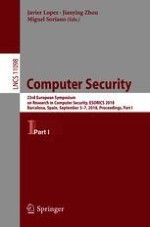2018 | OriginalPaper | Buchkapitel
PwIN – Pwning Intel piN: Why DBI is Unsuitable for Security Applications
verfasst von : Julian Kirsch, Zhechko Zhechev, Bruno Bierbaumer, Thomas Kittel
Erschienen in: Computer Security
Aktivieren Sie unsere intelligente Suche, um passende Fachinhalte oder Patente zu finden.
Wählen Sie Textabschnitte aus um mit Künstlicher Intelligenz passenden Patente zu finden. powered by
Markieren Sie Textabschnitte, um KI-gestützt weitere passende Inhalte zu finden. powered by
Abstract
x86-64 Linux as an example to show that assuming a program is running in context of a DBI framework (2) the presence thereof can be detected, (3) policies introduced by binary hardening mechanisms can be subverted, and (4) otherwise hard-to-exploit bugs can be escalated to full code execution.